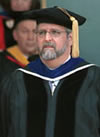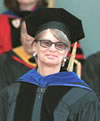2002 Metcalf Award Winners
Theo de Winter
 Since the era of the first moon landing, Professor Theo de Winter has been dispensing down-to-earth wisdom to generations of engineering students at Boston University. Practical, tough-minded and witty, he has earned a reputation for energizing student interest in the subject of manufacturing engineering, and enthusiastically guiding them as they pursue careers in the industry where he had already earned his spurs before entering academia. His appreciation for the realities of the business world and deft ability to convey them through humorous anecdotes has equipped his charges with both the technical skills and ethical grounding needed to succeed.
Since the era of the first moon landing, Professor Theo de Winter has been dispensing down-to-earth wisdom to generations of engineering students at Boston University. Practical, tough-minded and witty, he has earned a reputation for energizing student interest in the subject of manufacturing engineering, and enthusiastically guiding them as they pursue careers in the industry where he had already earned his spurs before entering academia. His appreciation for the realities of the business world and deft ability to convey them through humorous anecdotes has equipped his charges with both the technical skills and ethical grounding needed to succeed.
“Professor de Winter taught me the meaning of manufacturing engineering and how it relates to ‘real life’ applications,” says a former student. “He showed me what it meant to be an engineer and most importantly what it meant to become a good engineer using knowledge, common sense, and a good set of ethics.” Another recalls de Winter’s counseling: “His office was always filled with students. … We left with a better understanding of resources available to us in the manufacturing arena, a new found appreciation for the values and professionalism with which we should carry ourselves, or a clearer picture of our responsibilities to the industry.”
Professor de Winter began lecturing at Boston University in 1962, joining the faculty in 1969. His previous professional career began at Pratt & Whitney Aircraft in 1956 and included top engineering posts at Dynatech Corporation and AVCO before he co-founded the Magnetic Corporation of America company in Waltham. He received a B.A. in math and physics from Bowdoin College and three advanced degrees in mechanical engineering from MIT.
Fred S. Kleiner
 As a teacher, Fred Kleiner leaves a distinct impression. His “Introduction to Art History” is often an undergraduate’s first exposure to serious art scholarship — an enchanting, enlightening series of eloquent, enthusiastic, fact-packed, 90-minute guided tours through the ages of art. His ardent mentoring of graduate students and continually constructive criticism of their research projects often matures into trusted-colleague status in the world of classical art and archaeology.
As a teacher, Fred Kleiner leaves a distinct impression. His “Introduction to Art History” is often an undergraduate’s first exposure to serious art scholarship — an enchanting, enlightening series of eloquent, enthusiastic, fact-packed, 90-minute guided tours through the ages of art. His ardent mentoring of graduate students and continually constructive criticism of their research projects often matures into trusted-colleague status in the world of classical art and archaeology.
“Professor Kleiner seems to appreciate the tremendous responsibility of an instructor; he considers not just what he will teach, but how best to communicate, to evaluate, to encourage and to inspire. In Professor Kleiner’s hands, art becomes a medium for traveling through time, and around the world, to experience the wonders of distant cultures,” says a current student. Adds a former graduate student: “Professor Kleiner challenged his students to consider their research from a multitude of angles, but mixed this within an environment of such positivism that it was never perceived as work or frustration.”
Professor Kleiner’s impact beyond Boston University is evident in his work as principal author of recent editions of the Gardner’s Art through the Ages, which won the McGuffey Prize as best college textbook in the humanities and social sciences, his long-time role as editor-in-chief of the American Journal of Archaeology, and as host of Cablevision’s six-part Art History TV series.
On the Boston University faculty since 1978, Professor Kleiner earlier taught at the University of Virginia and as a visiting professor at Yale University. He received a B.A. in art history from the University of Pennsylvania, and both his master’s and doctorate in art history and archaeology from Columbia University.
Diana Wylie
 Professor Diana Wylie is widely acknowledged for her ability to make the history of Africa and Africans relevant to the lives of students. Her captivating lectures, laced with indigenous music or pictures from her extensive travels, dispel media-made myths of Africa by replacing erroneous generalizations with complex historical questions to be explored. Through this process of providing both creative thinking tools and the informational resources to answer questions accurately, Professor Wylie instills not only a desire to learn but also to understand.
Professor Diana Wylie is widely acknowledged for her ability to make the history of Africa and Africans relevant to the lives of students. Her captivating lectures, laced with indigenous music or pictures from her extensive travels, dispel media-made myths of Africa by replacing erroneous generalizations with complex historical questions to be explored. Through this process of providing both creative thinking tools and the informational resources to answer questions accurately, Professor Wylie instills not only a desire to learn but also to understand.
“Anybody with the proper degrees can be a professor, but only a gifted few can be a teacher. Professor Wylie is one of these gifted few,” says a former student. “Like a true teacher, Professor Wylie infected me with an increased thirst for knowledge and an increased desire to engage in scholarship. She taught me the art of scholarship. She taught me to think critically. She taught me how to uncover history. She taught me how to retell history. She taught me how to analyze history. She taught me how to be a history scholar.”
Professor Wylie’s gift for interpreting and retelling the histories of distant cultures grew from three decades of research across the African continent, including early stints with the Peace Corps in Kenya and as a journalism teacher at Algeria’s University of Oran. Her forceful perspectives are voiced in many publications, including her book Starving on a Full Stomach: Hunger and the Triumph of Cultural Racism in Modern South Africa and a contribution in the Oxford History of the British Empire on the human impact of African colonization.
Joining the Boston University faculty in 1994, Professor Wylie received a B.A. in modern European history from Goucher College, a master’s in literature from Edinburgh University and her Ph.D. in history from Yale University. She also has taught at Yale, Harvard University, Mount Holyoke College and Vassar College.
